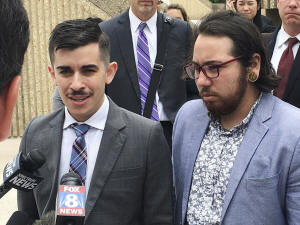First transgender attorney to argue before the Supreme Court,
challenging health care ban for minors
 Send a link to a friend
Send a link to a friend
 [December 02, 2024]
By LINDSAY WHITEHURST [December 02, 2024]
By LINDSAY WHITEHURST
WASHINGTON (AP) — When the Supreme Court this week wades into the
contentious issue of transgender rights, the justices will hear from an
attorney with knowledge that runs deep.
Chase Strangio will be the first openly transgender attorney to argue
before the nation's highest court, representing families who say
Tennessee’s ban on health care for transgender minors leaves their
children terrified about the future.
Arguments in the case come amid heightened pushback to transgender
rights, including a presidential campaign where Republican Donald Trump
put his fierce opposition front and center.
Strangio will bring months of intense legal preparation to the case as
well as hard-won lessons from his own experience.
“I am able to do my job because I have had this health care that
transformed and, frankly, saved my life,” he said. “I am a testament to
the fact that we live among everyone.”
Strangio grew up outside of Boston and came out as trans when he was in
law school. Now 42, he's an American Civil Liberties Union attorney
whose legal career has included representing former Army intelligence
analyst Chelsea Manning, challenging a ban on transgender people serving
in the military and helping win a LGBTQ worker-discrimination case at
the Supreme Court. He's also the father of a 12-year-old, the son of a
father who supports Trump, and has a close relationship with his
Army-veteran brother.

He's also an advocate, speaking out as a series of U.S. states banned
gender-affirming health care for minors. The laws are part of a wave of
restrictions on school sports participation and bathroom usage around
the country. After the first openly transgender person was elected to
Congress, House Speaker Mike Johnson, R-La., declared support for
restricting bathroom use to sex assigned at birth.
Tennessee, meanwhile, will argue before the Supreme Court that
treatments like puberty blockers and hormones carry risks for young
people and its law protects them from making treatment decisions
prematurely.
“Tennessee, like many other states, acted to ensure that minors do not
receive these treatments until they can fully understand the lifelong
consequences or until the science is developed to the point that
Tennessee might take a different view of their efficacy,” state
attorneys wrote in court filings.
[to top of second column]
|

ACLU lawyer Chase Strangio, left, and plaintiff Joaquin Carcano
address reporters after a hearing, June 25, 2018, in Winston-Salem,
N.C., on their lawsuit challenging the law that replaced North
Carolina's "bathroom bill." Carcano and other transgender plaintiffs
argue the new law continues to discourage transgender people from
using restrooms that match their gender identity. (AP Photo/Jonathan
Drew, File)
 Arguing for Tennessee is state
Solicitor General Matt Rice. He served in 2019 as a clerk for
Justice Clarence Thomas, who dissented from the transgender
worker-discrimination case Strangio worked on that term. The state
attorney general's office did not make Rice available for an
interview ahead of arguments, but his background also includes a
couple of years as a minor league baseball player for the Tampa Bay
Rays before he earned his law degree from the University of
California, Berkeley.
The Biden administration is supporting the challenge to Tennessee's
law, but the federal government’s position is expected to change
after Trump takes office in January. Strangio said he'll
nevertheless keep advocating for transgender youth to access health
care that wasn't available when he was young.
“Many of us think about our childhood and young adulthood as lost
years, when we were just simply disembodied from our core,” he said.
Major medical groups, including the American Medical Association and
the American Academy of Pediatrics, oppose the bans and have
endorsed such care, saying it’s safe when administered properly.
Strangio also pointed out that many medical interventions for young
people, like gastric bypass surgeries for weight loss, carry some
risk and it makes sense to inform families and let them decide.
“There is harm that is compounded when we are forcing young people
to be denied care that their doctors and their parents and they
themselves all agree they need,” he said.
The Supreme Court is expected to decide the case by the summer.
___
Associated Press writer Mark Sherman contributed to this report.
All contents © copyright 2024 Associated Press. All rights reserved
 |